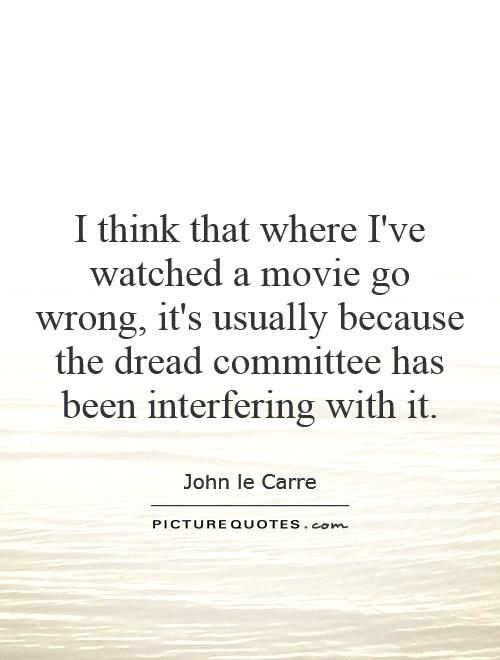I think that where I've watched a movie go wrong, it's usually because the dread committee has been interfering with it

I think that where I've watched a movie go wrong, it's usually because the dread committee has been interfering with it
John le Carré, the renowned British author of espionage novels, is no stranger to the world of film adaptations. Many of his works have been brought to the big screen, with varying degrees of success. In a recent interview, le Carré expressed his thoughts on why some movie adaptations of his novels have gone wrong, pointing to the interference of what he calls the "dread committee."Le Carré's reference to the dread committee is a nod to the various executives, producers, and studio heads who often have a hand in shaping the final product of a film adaptation. These individuals may have their own agendas, preferences, and ideas about what will make a successful movie, and their interference can sometimes lead to a departure from the original vision of the author.
In the context of le Carré's works, which are known for their intricate plots, complex characters, and moral ambiguity, the dread committee's meddling can be particularly damaging. These elements are often what make le Carré's novels so compelling and thought-provoking, and when they are watered down or simplified for the sake of mass appeal, the essence of the story can be lost.
One of the most famous examples of a le Carré adaptation that fell victim to the dread committee is the 2011 film "Tinker Tailor Soldier Spy." While the film was generally well-received by critics and audiences, some fans of the novel felt that it failed to capture the depth and nuance of the original story. Le Carré himself has been critical of certain aspects of the adaptation, suggesting that the dread committee may have played a role in shaping the final product.
Despite these challenges, there have been successful adaptations of le Carré's works, such as the 2016 miniseries "The Night Manager," which was praised for its faithfulness to the source material. In cases like these, it seems that when the dread committee takes a step back and allows the story to speak for itself, the result can be a compelling and engaging film or series.












 Friendship Quotes
Friendship Quotes Love Quotes
Love Quotes Life Quotes
Life Quotes Funny Quotes
Funny Quotes Motivational Quotes
Motivational Quotes Inspirational Quotes
Inspirational Quotes